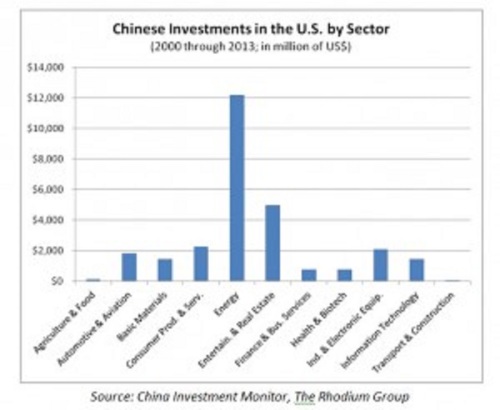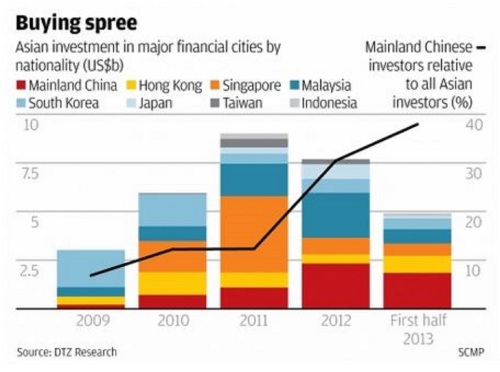Please note that although the Reuters news report below does not say it, there is good reason to believe that at least some of the Chinese companies purchasing U.S. residential and now, also commercial, real estate are state-owned entities, including those owned by the People’s Liberation Army.
Reuters reports, Dec. 23, 2013:
Chinese investors, the second-biggest overseas buyers of U.S. residential real estate, are building up portfolios of U.S. commercial property as they look for new avenues of diversification.
Chinese entities announced more than $5.89 billion in projects in January-October, nearly six times the $996 million for all of 2011 and 2012 combined, showed data from New York-based consultancy Rhodium Group.
“There is a lot of upside,” said Thilo Hanemann, Rhodium’s research director. “We are at the beginning of a structural increase of Chinese investment in U.S. commercial real estate.”
This week, Greenland Holding Group Co. completed a deal that will give the Shanghai-based developer a 70 percent stake in Forest City Enterprises Inc’s Atlantic Yards, a 22-acre commercial and residential project in Brooklyn, New York. The deal, which is expected to require $4.8 billion worth of investment over 8 years, is the largest property transaction by a Chinese company in the United States.
China’s push into U.S. property is underpinned by declining investment returns at home, a growing desire by wealthy individuals and developers to diversify their holdings overseas, and property companies looking to capitalize on offshore migration.
“Some investors want to diversify their assets, and some are looking for different growth opportunities,” said Julien Zhang, international director in Beijing for property consultancy Jones Lang Lasalle, which is advising three Chinese conglomerates on property deals. “Others want to learn how to enter mature and developed markets.”
A rebound in U.S. real estate pricing, tight inventory in major cities, and continued low interest rates also are attracting Chinese buyers, said Gary Locke, the U.S. ambassador to China.
Locke was speaking this week at a forum in Beijing sponsored by the U.S. Embassy to promote Chinese investment in U.S. property. Chinese investment in the United States has surged to $18.5 billion over the last two years, more than the combined total of the previous 11 years, Locke said.
Chinese nationals bought more than $8.1 billion worth of real estate in the year ended March 31, representing 12 percent of the estimated $68.2 billion of domestic property purchased by overseas nationals and second only to Canadians, according to a survey by the National Association of Realtors.
“Real estate is finally becoming a global industry and you will see capital flows on a cross-border basis, just like every other investment class,” said Rob Speyer, the co-chief executive of Tishman Speyer Properties LP, which partnered in February with China Vanke Co Ltd to build a $620 million apartment project in San Francisco.
Speyer, whose company is also developing commercial, residential and retail projects in the Chinese cities of Shanghai, Chengdu and Tianjin, said he courted Vanke’s Chairman Wang Shi for more than two years, and inked their deal only 45 days after first introducing the project to him.
Not everyone is convinced that Chinese investment in the U.S. property market will continue uninterrupted. Other options for expansion include Europe, Australia and Singapore, which account for about two-thirds of offshore Chinese real estate investment, according to Jones Lang Lasalle.
Zhang Xin, the chief executive of SOHO China Ltd, who paid $700 million through her family trust to buy a stake in the General Motors Building in Manhattan, said that while the U.S. regulatory and legal environment remained attractive, valuations were getting expensive. “I would not feel as comfortable today putting in money as I did a few years ago,” Zhang said.
- “Red Star over JPMorgan’s One Chase Manhattan,” Oct. 18, 2013.
- “China’s purchase of iconic U.S. Smithfield Foods raises food safety questions,” Oct. 25, 2013.



